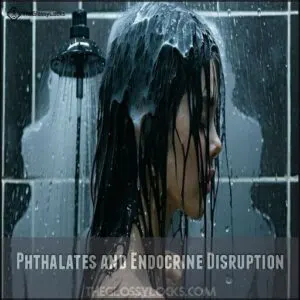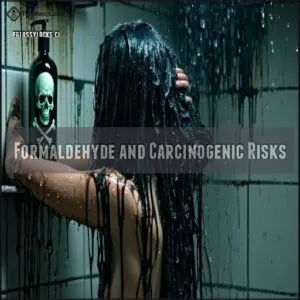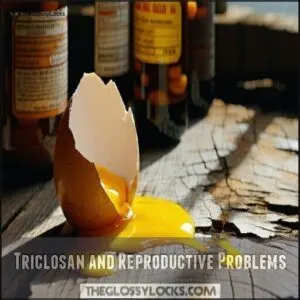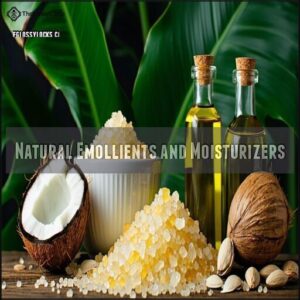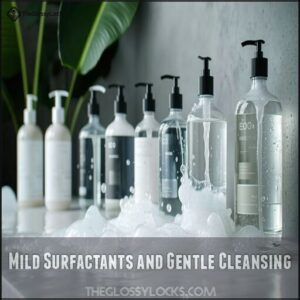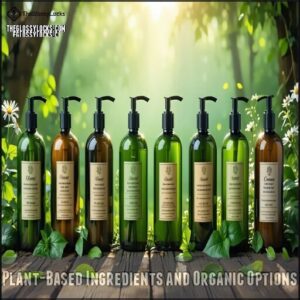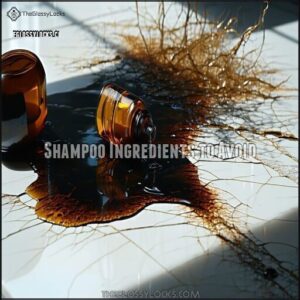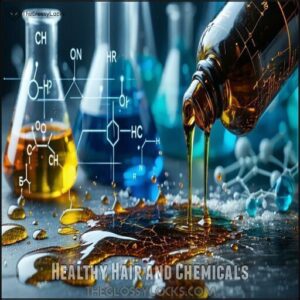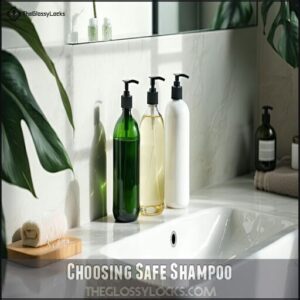This site is supported by our readers. We may earn a commission, at no cost to you, if you purchase through links.
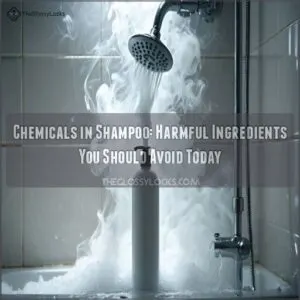
Common chemicals in shampoo include sulfates (the cleaning agents that create lather), parabens (preservatives), phthalates (fragrance stabilizers), and formaldehyde releasers.
These ingredients can irritate your scalp, disrupt hormones, and potentially contribute to health concerns over time.
While not all chemicals are harmful—water is technically a chemical too—many commercial formulas contain unnecessary harsh additives, giving these substances VIP access to your body through your scalp’s absorption.
Understanding what’s hiding in that bottle might change how you view that satisfying lather next time you’re in the shower, considering the potential impact of these harsh additives and the fact that they can disrupt hormones.
Table Of Contents
- Key Takeaways
- Chemicals in Shampoo
- Harmful Shampoo Ingredients
- Safe Shampoo Alternatives
- Shampoo Ingredients to Avoid
- Healthy Hair and Chemicals
- Choosing Safe Shampoo
- Frequently Asked Questions (FAQs)
- Which chemical is used in shampoo?
- What shampoo ingredients should we avoid?
- Which shampoo has high chemicals?
- How can I tell if a shampoo contains harmful chemicals?
- What are the long-term effects of using shampoo with chemicals?
- Are there any natural alternatives to chemical-based shampoos?
- Are there any regulations on which chemicals are allowed in shampoos?
- How do shampoo chemicals affect pregnancy?
- Can shampoo chemicals enter bloodstream?
- How often should sulfate-free shampoo be used?
- Conclusion
Key Takeaways
- Your shampoo likely contains sulfates (cleaning agents), parabens (preservatives), and phthalates (fragrance stabilizers) that can irritate your scalp, disrupt hormones, and potentially contribute to health concerns over time.
- You’ll want to avoid formaldehyde releasers, triclosan, and artificial fragrances, as these chemicals have been linked to carcinogenic risks, reproductive problems, and allergic reactions.
- You can find safer alternatives by choosing products with natural emollients (like coconut and jojoba oils), mild surfactants, and plant-based ingredients that clean effectively without stripping your hair’s natural oils.
- You should look for certifications like USDA Organic, EWG Verified, and Non-GMO when selecting shampoos to ensure you’re making safer choices for both your health and the environment.
Chemicals in Shampoo
You mightn’t think twice about the ingredients in your shampoo, but some can do more harm than good.
From sulfates to parabens, certain chemicals can strip your hair’s natural oils or even interfere with your hormones.
Sulfates and Their Effects
Sulfates, like sodium laureth sulfate and ammonium lauryl sulfate, are common cleansing agents, but they can strip natural oils, leaving hair dry.
If you’ve got sulfate sensitivity, consider alternatives.
Sulfates may:
- Cause scalp irritation.
- Lead to frizz or hair damage.
- Dull color-treated hair.
- Disrupt moisture balance.
- Be misunderstood—sulfate research shows they’re not carcinogenic.
Sulfate-free shampoo offers gentler options.
Parabens and Hormonal Interference
Parabens, common preservatives, are known endocrine disruptors that mimic estrogen.
Parabens mimic estrogen, disrupting hormones and posing risks to thyroid health, fertility, and even increasing the chance of breast cancer.
This hormone disruption can impact thyroid health, increase infertility risks, and even link to breast cancer.
Children’s health is particularly vulnerable, as developing tissues are more sensitive.
Reducing paraben exposure protects against reproductive disorders and potential cancer links.
Checking labels helps you avoid these hidden threats in your shampoo, many products use them because they’ve antimicrobial properties.
Polyethylene Glycols (PEG) and Skin Irritation
Polyethylene glycols (PEG) are common shampoo chemicals, but they can irritate sensitive skin or worsen conditions like eczema.
PEG manufacturing often involves harmful byproducts, raising concerns about absorption into the skin.
Consider these tips:
- Look for PEG-free shampoos.
- Try natural PEG alternatives like aloe vera.
- Avoid products labeled with “propylene glycol.”
- PEG sensitivity? Test on a small area first.
- Choose certified organic options.
Harmful Shampoo Ingredients
You mightn’t realize it, but some common shampoo ingredients could be doing more harm than good.
From disrupting hormones to causing skin irritation, understanding what’s in your bottle is key to protecting your health.
Phthalates and Endocrine Disruption
Phthalates, common in consumer products, are endocrine disruptors linked to hormone disruption and reproductive system issues.
They can affect your endocrine system, causing hormonal imbalance and early puberty in girls.
Regulation efforts are ongoing, but caution is key.
Avoid shampoos with hidden phthalates, often labeled as “fragrance.”
| Effect | Impact | Risk Group | Example |
|---|---|---|---|
| Hormone Disruption | Alters endocrine function | All ages | Fragrance additives |
| Reproductive Health Risk | Decreased fertility | Adults, Pregnant women | Phthalate compounds |
| Early Puberty | Accelerated development | Young girls | Shampoo fragrances |
| Thyroid Issues | Affects metabolism regulation | General population | Endocrine disruptors |
Formaldehyde and Carcinogenic Risks
When considering toxic chemicals in shampoos, formaldehyde exposure stands out for its cancer risk.
Classified as a carcinogen, it’s linked to leukemia and sinus cancers. Released during heat styling, it poses respiratory dangers.
Regulatory limits exist, but risks remain, especially for salon workers. Opt for formaldehyde alternatives in shampoos to protect your health and reduce hormone disruption concerns.
Many products contain methylene glycol variations that release formaldehyde.
Triclosan and Reproductive Problems
Triclosan exposure can mess with your hormones, leading to potential fertility impacts and pregnancy risks.
It’s an endocrine disruptor that may harm your reproductive health.
Here’s why you should avoid it:
- Causes hormonal disruption.
- Triggers immune effects and sensitivities.
- Disrupts the reproductive system.
- Linked to hormone disruption in studies.
- Raises concerns about long-term reproductive system disruption.
Safe Shampoo Alternatives
You don’t have to settle for shampoos loaded with harsh chemicals when safer, effective options are available.
From plant-based ingredients to gentle cleansers, these alternatives keep your hair healthy without the risks, using gentle cleansers.
Natural Emollients and Moisturizers
If your hair feels like straw, plant-based emollients like coconut oil or jojoba oil can work wonders.
Organic moisturizers, including shea butter, boost hair hydration and shine without harmful additives.
Seed oil benefits, such as from argan or sunflower oil, are unmatched for softness.
Many people find emollient product options helpful for dry hair.
Try DIY hair masks with these ingredients for natural, chemical-free hair moisture using natural hair emollients.
Mild Surfactants and Gentle Cleansing
Switching to mild surfactants offers gentle cleansing without stripping your scalp’s natural oils.
These sulfate-free shampoo ingredients, often found in baby shampoos, are perfect for scalp sensitivity.
Gentle formulas with eco-friendly options, like coconut-derived surfactants, clean effectively while being kind to both your hair and the planet.
Consider browsing a mild surfactants shampoo for sensitive skin.
Ditch harsh detergents—your hair deserves better care with these surfactant alternatives.
Plant-Based Ingredients and Organic Options
Organic shampoo with plant-based benefits is a game-changer for healthier hair.
Look for organic certifications ensuring sustainable sourcing and natural ingredients. Vegan shampoos often skip harsh chemicals, relying on gentle, plantbased formulas.
Curious about DIY recipes? You can craft natural shampoo at home using aloe vera or coconut oil.
Sulfate-free options reduce scalp irritation. Organic ingredients nourish your scalp without compromising the planet—win-win, with sustainable sourcing and natural ingredients being key to a healthier hair experience.
Shampoo Ingredients to Avoid
You mightn’t think twice about the ingredients in your shampoo, but some can harm your hair and health over time.
Knowing which chemicals to avoid helps you make safer choices for both your scalp and the environment.
Alcohol and Dryness
Alcohol in shampoos can zap moisture, leaving your hair dry and brittle.
Watch out for these culprits:
- Isopropyl Alcohol: Strips natural oils, leading to hair dryness.
- Ethanol: A common drying mechanism causing hair damage.
- SD Alcohol 40: Harsh on hair, increasing brittleness.
- Methanol: Drains hydration, weakening strands.
Opt for safe alcohols like fatty alcohols to maintain hydration.
Fragrances and Allergic Reactions
Fragrances in shampoos often hide under vague terms like “parfum,” masking synthetic fragrances that can trigger skin irritation or allergic reactions.
These hidden fragrances exploit labeling loopholes, making it tough to spot potential irritants.
If you’ve got fragrance sensitivity, look for products with natural scents like essential oils. Always check labels closely to avoid fragrance allergens and keep your scalp happy.
Colors and Potential Carcinogens
After fragrances, colors in shampoos can hide risks like carcinogens.
Coal tar, often used for darker tones, raises cancer concerns.
Hair dyes with PPD or resorcinol may irritate skin or disrupt hormones.
Selenium sulfide, found in anti-dandruff products, is another red flag.
Safer dye alternatives avoid toluene and harsh chemicals, protecting your scalp while keeping your hair vibrant and healthy.
Many also try to avoid products with harmful parabens and sulfates, which is a key consideration for healthy hair.
Healthy Hair and Chemicals
You mightn’t think twice about the chemicals in your shampoo, but they can impact your hair’s health more than you realize.
Understanding which ingredients to avoid helps you protect your locks and keep them looking their best.
Endocrine Disruptors and Health Risks
Endocrine disruptors in shampoos, like parabens and phthalates, can wreak havoc on your hormonal balance, leading to thyroid issues, reproductive health problems, and immune disruption.
These toxic chemicals mimic hormones, increasing cancer risks and other health concerns, which can lead to hormone disruption and long-term health issues.
Avoiding products with these hidden carcinogens is a smart move for reducing hormone disruption and protecting long-term health. Always check ingredient labels carefully!
Clean Beauty Movement and Consumer Awareness
Understanding chemical exposure from shampoos ties directly to the clean beauty movement. It’s about ingredient awareness and making safer choices.
Consumer education empowers you to avoid harmful chemicals by reading product labels.
Look for:
- Clear ingredient labels without hidden toxins.
- Brands promoting transparency and safety.
- Products free of sulfates and parabens.
- Natural, plant-based alternatives.
- Evidence-backed certification impact on health, which is crucial for making safer choices.
Certifications and Labels to Look For
When scanning product labels, look for USDA organic, EWG Verified, and Non-GMO certifications to guarantee safer choices.
Organic certification guarantees strict organic standards, while cruelty-free labels and biodegradable packaging show ethical commitment.
The Non-GMO Project avoids genetically modified ingredients. EWG Verified products minimize toxins, offering peace of mind.
These symbols simplify picking shampoos aligned with your values and health priorities. Checking for Leaping Bunny certifications can further confirm ethical standards.
Choosing Safe Shampoo
You’ll find safer options for your hair by checking for products free of sulfates, parabens, and phthalates on ingredient labels.
Reading these labels isn’t exactly a thrilling Saturday night activity, but it’s your best defense against exposing your scalp to potentially harmful chemicals.
Avoiding Harsh Chemicals and Toxins
In terms of cutting out harsh chemicals from your hair care routine, start by turning over bottles and checking labels carefully.
Toxin exposure from ingredients like sulfates and parabens can impact your holistic health over time.
Research ingredients before purchasing, look for sulfate-free and paraben-free shampoo options, and seek safer alternatives that don’t contain carcinogens or endocrine disruptors.
Label reading is your first defense against harmful chemicals.
Selecting Shampoos for Specific Hair Types
Now that you know which ingredients to avoid, let’s match your hair type with the right shampoo. Your hair’s unique needs matter!
When selecting products, consider:
- Oily hair needs clarifying formulas with gentle surfactants but without silicones
- Dry or curly hair benefits from moisturizing shampoos with natural oils
- Color-treated or fine hair requires sulfate-free options with protective ingredients
Those with oily hair may benefit from a shampoo that addresses excess sebum production.
Remember, the perfect shampoo balances effective cleaning with your hair texture’s specific requirements.
Frequently Asked Questions (FAQs)
Which chemical is used in shampoo?
Over 80% of commercial shampoos contain sodium lauryl sulfate (SLS) as their primary cleansing agent.
You’ll also find preservatives like parabens, moisturizers like glycerin, and fragrance compounds in your everyday shampoo products.
What shampoo ingredients should we avoid?
You should avoid sulfates, parabens, silicones, formaldehyde, methylisothiazolinone, triclosan, phthalates, and coal tar in your shampoo.
These harsh chemicals can strip natural oils, cause irritation, and potentially disrupt your hormonal balance.
Which shampoo has high chemicals?
Brands like Pantene, Garnier Fructis, Suave, Bumble and Bumble, and salon brands often contain high chemical loads including sulfates, parabens, fragrances, and PEGs.
You’ll find these chemical cocktails lurking behind those fancy bottles on store shelves, which can be a concern due to the presence of parabens.
How can I tell if a shampoo contains harmful chemicals?
Check the ingredient list for sulfates, parabens, phthalates, and formaldehyde. You’ll often find these harmful chemicals hiding behind scientific names. Look for products labeled "clean," "natural," or with EWG certification.
What are the long-term effects of using shampoo with chemicals?
Continuous use of chemical-laden shampoos can lead to scalp irritation, hormonal disruption, and potential long-term health risks.
You’re basically absorbing these endocrine disruptors through your skin every time you wash your hair, which can lead to hormonal disruption.
Are there any natural alternatives to chemical-based shampoos?
You can swap to coconut oil-based cleansers, apple cider vinegar rinses, or DIY mixtures with essential oils.
These natural alternatives won’t strip your hair’s oils while still providing effective cleaning power.
Are there any regulations on which chemicals are allowed in shampoos?
Yes, the FDA regulates shampoo ingredients in the US, while the EU has stricter standards banning over 1,300 chemicals.
You’ll find that regulations vary worldwide, with some countries offering more consumer protection than others.
How do shampoo chemicals affect pregnancy?
During pregnancy, your baby’s development can be affected by endocrine disruptors like parabens, phthalates, and triclosan found in regular shampoos.
These chemicals may increase risks of pregnancy complications and developmental issues.
Can shampoo chemicals enter bloodstream?
Your skin absorbs, your body receives, and your bloodstream carries shampoo chemicals throughout your system.
Some ingredients, especially parabens and phthalates, can penetrate skin barriers and enter your circulation during regular washing routines.
How often should sulfate-free shampoo be used?
You can use sulfate-free shampoo 2-3 times weekly for normal hair, or daily if your hair is oily.
Your hair type and lifestyle determine frequency – adjust based on how your scalp feels.
Conclusion
Like silent hitchhikers, chemicals in shampoo can impact your health without your knowledge.
You’re now equipped to make better choices for your hair care routine by avoiding harmful ingredients and selecting safer alternatives.
Remember, what touches your scalp matters. By reading labels and choosing products free from toxic chemicals in shampoo, you’re not just caring for your hair—you’re investing in your long-term health and well-being.
- https://www.ncbi.nlm.nih.gov/pmc/articles/PMC8157593/
- http://fragrancematerialsafetyresource.elsevier.com/sites/default/files/AB-2-Bickers-Safety.pdf
- https://med.nyu.edu/faculty/leonardo-trasande
- https://www.sciencedirect.com/science/article/pii/S1438463920305708
- https://www.cdc.gov/biomonitoring/index.html

